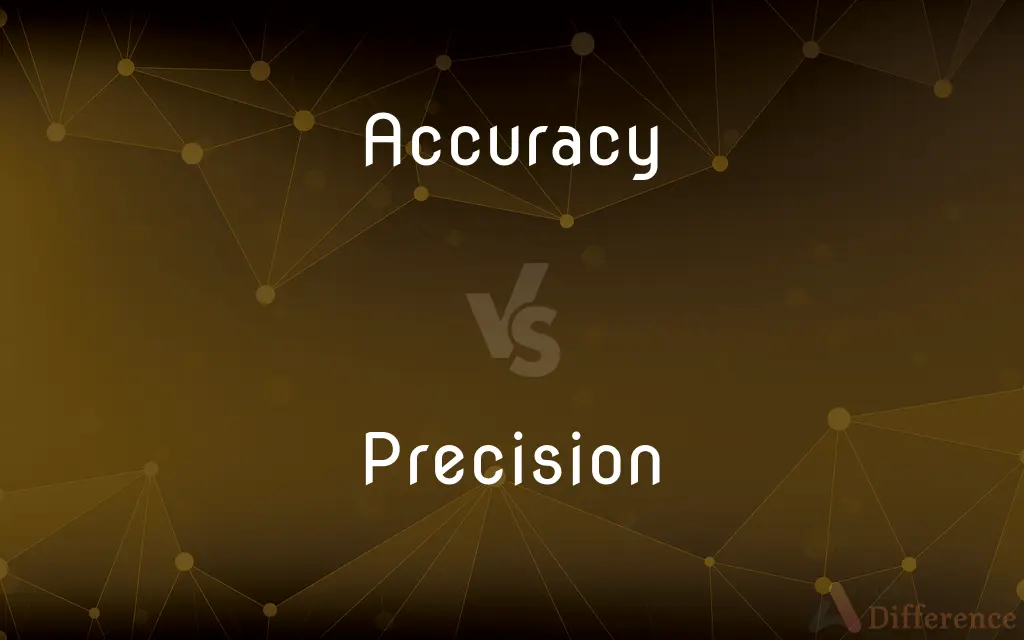Accuracy vs. Precision — What's the Difference?
Edited by Tayyaba Rehman — By Fiza Rafique — Updated on November 2, 2023
Accuracy refers to how close measurements are to the true value, while precision indicates how close measurements are to each other.

Difference Between Accuracy and Precision
Table of Contents
ADVERTISEMENT
Key Differences
Accuracy is about closeness to the true or intended value. It is a measure of correctness. Precision, on the other hand, refers to the consistency of results, even if they are not correct. For instance, a clock that doesn't tell the correct time is inaccurate, even if it is precise in its incorrectness.
Precision denotes the level of refinement and exactness in the performance of an operation or the measurement of data. It is about reproducibility. Accuracy, however, is indicative of a measurement’s degree of veracity, showing how close it comes to the actual or known standard.
An accurate measurement is not necessarily precise if it is not repeatable. Conversely, precise measurements can be consistently off-target, and thus, not accurate. Accuracy yields validity, while precision offers reliability, both crucial in various fields like science, engineering, and statistics.
In data, high accuracy low precision can occur when measurements are correct on average, but there is wide variation. High precision but low accuracy happens with tight clustering of measurements that are far from the target. Ideally, one seeks high accuracy and high precision.
A dartboard analogy illustrates these concepts; accurate throws hit the bullseye, while precise throws consistently land in the same area, which may or may not be near the bullseye. Accurate and precise throws consistently hit the bullseye with little variation.
ADVERTISEMENT
Comparison Chart
Definition
Closeness to the true value.
Consistency of results.
Measure of
Correctness.
Consistency or repeatability.
Key Quality
Validity.
Reliability.
Possible to be
Accurate without precision, precise without accuracy.
Precise without accuracy, not vice versa.
Example in Dartboard
Hitting the bullseye.
Darts closely grouped, regardless of location.
Compare with Definitions
Accuracy
Correctness or truthfulness.
The accuracy of the article was later called into question.
Precision
Refinement in a measurement, calculation, or specification.
She cut the fabric with precision to ensure a perfect fit.
Accuracy
The degree to which the result of a measurement conforms to the correct value.
The scale's accuracy was vital for the experiment.
Precision
Exactness of meaning or expression.
He chose his words with precision to avoid any misunderstandings.
Accuracy
Fidelity to an original or a standard.
Her portrayal of the historical figure was praised for its accuracy.
Precision
The quality of being exact and accurate.
The engineer measured the components with high precision.
Accuracy
Conformity to truth or fact.
The accuracy of his testimony was confirmed by the evidence.
Precision
Marked by or adapted for accuracy and exactness.
Precision tools are required for delicate surgeries.
Accuracy
The quality or state of being correct or precise
We have confidence in the accuracy of the statistics
Precision
The quality, condition, or fact of being exact and accurate
The deal was planned and executed with military precision
Accuracy
Conformity to fact.
Precision
The state or quality of being precise; exactness.
Accuracy
Precision; exactness.
Precision
The ability of a measurement to be consistently reproduced.
Accuracy
The ability of a measurement to match the actual value of the quantity being measured.
Precision
The number of significant digits to which a value has been reliably measured.
Accuracy
The state of being accurate; being free from error; exactness; correctness
Precision
Used or intended for accurate or exact measurement
A precision tool.
Accuracy
Exact conformity to truth, or to a rule or model; degree of conformity of a measure to a true or standard value.
The jury doubted the accuracy of the witness' comments.
Precision
Made so as to vary minimally from a set standard
Precision components.
Accuracy
The state of being accurate; freedom from mistakes, this exemption arising from carefulness; exact conformity to truth, or to a rule or model; precision; exactness; nicety; correctness; as, the value of testimony depends on its accuracy.
The professed end [of logic] is to teach men to think, to judge, and to reason, with precision and accuracy.
The accuracy with which the piston fits the sides.
Precision
Of or characterized by accurate action
Precision bombing.
Accuracy
The quality of nearness to the truth or the true value;
He was beginning to doubt the accuracy of his compass
The lawyer questioned the truth of my account
Precision
The state of being precise or exact; exactness.
Accuracy
(mathematics) the number of significant figures given in a number;
The atomic clock enabled scientists to measure time with much greater accuracy
Precision
The ability of a measurement to be reproduced consistently.
Precision
(mathematics) The number of significant digits to which a value may be measured reliably.
Precision
(bridge) A bidding system that makes use of many artificial bids to describe a hand quite precisely.
Precision
Used for exact or precise measurement.
Precision
Made, or characterized by accuracy.
Precision
The quality or state of being precise; exact limitation; exactness; accuracy; strict conformity to a rule or a standard; definiteness.
I have left out the utmost precisions of fractions.
Precision
The quality of being reproducible in amount or performance;
He handled it with the preciseness of an automaton
Note the meticulous precision of his measurements
Common Curiosities
Can a measurement be precise but not accurate?
Yes, measurements can be consistently close to each other but far from the target value.
What defines accuracy?
Accuracy refers to how close a measurement is to its true or actual value.
What does precision indicate?
Precision indicates the repeatability or consistency of measurements.
Why is accuracy important?
Accuracy is important because it ensures the correctness of a measurement or assessment.
Why is precision necessary?
Precision is necessary for consistency, which is crucial for the reliability of repeated measurements.
How do you improve accuracy?
Improving accuracy often involves calibration and eliminating systematic errors.
How do you increase precision?
Increasing precision typically requires consistent methodology and refined equipment or processes.
Is it possible to have accuracy without precision?
Yes, you can have an accurate average of measurements that are not close to each other.
In what fields are accuracy and precision most important?
Accuracy and precision are vital in fields like science, engineering, medicine, and data analysis.
Are there instruments that provide both accuracy and precision?
Yes, high-quality instruments are designed to provide both accurate and precise measurements.
Can you measure accuracy?
Yes, by comparing measurements to a known standard or true value.
Is accuracy or precision more important?
The importance of accuracy vs. precision varies depending on the context and application.
Can a tool be calibrated to improve accuracy and precision?
Yes, calibration can improve a tool’s accuracy and precision by adjusting it to standard measurements.
How do I know if my measurements are accurate and precise?
You can determine this through statistical analysis, comparing them to known values, and evaluating consistency.
How is precision measured?
Precision is measured by the spread of variations in repeated measurements.
Share Your Discovery

Previous Comparison
Wail vs. Whale
Next Comparison
Turtle vs. TortoiseAuthor Spotlight
Written by
Fiza RafiqueFiza Rafique is a skilled content writer at AskDifference.com, where she meticulously refines and enhances written pieces. Drawing from her vast editorial expertise, Fiza ensures clarity, accuracy, and precision in every article. Passionate about language, she continually seeks to elevate the quality of content for readers worldwide.
Edited by
Tayyaba RehmanTayyaba Rehman is a distinguished writer, currently serving as a primary contributor to askdifference.com. As a researcher in semantics and etymology, Tayyaba's passion for the complexity of languages and their distinctions has found a perfect home on the platform. Tayyaba delves into the intricacies of language, distinguishing between commonly confused words and phrases, thereby providing clarity for readers worldwide.















































